In ascending order, here are the top six reasons I consider Dragon Age: Origins one of my two or three favorite video games ever.
6. World
After working with Star Wars and D&D worlds for a decade, BioWare entered Dragon Age with a clean slate, eager to create a massive world with a sustainable franchise. (I remember with an interview of one of the directors at BioWare stating that they wanted Dragon Age to be a thirty-game series, and Origins is “game number zero” of that series, intended to introduce the universe more than anything else. They did not honor this numbering when they titled the disappointing sequel Dragon Age 2.)
On the surface, the Dragon Age world is not particularly unique, borrowing heavily from Tolkien, A Song of Ice and Fire, and other classic fantasy franchises. The dwarves drink and swear a lot, the elves are mystical and whiny, and the humans are prejudiced and self-absorbed. If you haven’t seen these traits in these races a dozen times before, you probably don’t read much fantasy.
But the world is mature and deep enough that I quickly did not care about the cliches. There are lots of nice little twists on the usual fantasy trope that you’ll be caught off guard. And a game like this is the perfect way to convey the immensity and richness of a universe: I always felt like there was something interesting or surprising around every corner.
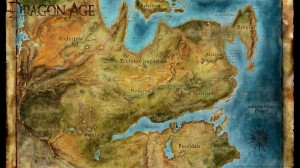 The world, as conceived by by BioWare thus far, is also astoundingly huge. The entirety of Dragon Age: Origins takes place in one small region of one continent. (The continent’s name, by the way, is Thedas. They came up with this name because they had trouble naming the continent and tentatively called it “The Dragon Age Setting,” or “The DAS.”)
The world, as conceived by by BioWare thus far, is also astoundingly huge. The entirety of Dragon Age: Origins takes place in one small region of one continent. (The continent’s name, by the way, is Thedas. They came up with this name because they had trouble naming the continent and tentatively called it “The Dragon Age Setting,” or “The DAS.”)
It’s not just the physical scope of the world, but the variety in it. This game was in the works for 10 years before it was released, and that level of effort shows: The amount of art, unique settings, and creative level design in this game is almost mind-blowing.
The Dragon Age games also include absurdly detailed “codex” entries that provide an encyclopedic backstory and explanation for the world. There’s a lot to dig into if you’re curious (which I am) that can provide dozens of hours of enjoyment.
5. Characters and Dialogue
Dragon Age: Origins has some of my favorite dialogue in any game. It’s jam packed with great writing and voice acting so that the times when you retreat from battle and catch up with characters is just as fun (if not moreso) than the actual questing.
Your protagonist is not voice acted — which may be my #1 complaint with the game; it really distracts from the immersion — but so many of the other characters are fleshed out with brilliant writing and high level voice acting.
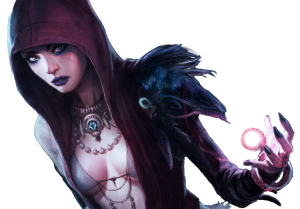 Almost all of the characters get compelling origin stories, but my personal favorite is definitely Morrigan, one of my favorite video game characters. Persnickety and unpredictable, she gets some of the best lines (especially when insulting Alistair). She also has by far the most compelling backstory and some wild twists and possible outcomes in the way her story unfolds.
Almost all of the characters get compelling origin stories, but my personal favorite is definitely Morrigan, one of my favorite video game characters. Persnickety and unpredictable, she gets some of the best lines (especially when insulting Alistair). She also has by far the most compelling backstory and some wild twists and possible outcomes in the way her story unfolds.
The other characters range from classic (Alistair) to forgettable (Wynne), but all of them add depth and variety to the Dragon Age universe by showing some interesting facet of the culture.
4. Story
Dragon Age tells a huge story, and it’s the type of “huge” that feels epic and dramatic rather than padded (*cough* Elder Scrolls).
You start as a humble kid — with a choice of six playable origin stories– but gradually immerse yourself in bigger, more dangerous tasks. By the end, you really feel like you’re facing the apocalypse, and the fate of it rests on your shoulder. You look back on everything that led you there — your journeys deep into volcanic mines, through a cursed mage tower, into the haunted heart of a forest, etc. — and it truly feels like you’ve come a long way.
The premise of the story is that you join a legion of warriors called Grey Wardens responsible for preventing cursed creatures from taking over the kingdom of Ferelden. After the king and several Grey Wardens are murdered by a greedy politician, it’s up to you and your friend Alistair to unite the world against a newly rising blight of evil — led by an Archdemon Dragon.
Along the way, there are several surprising plot threads, including an epic “Landsmeet” summit to determine the political fate of Ferelden. The “Landsmeet” is just one of many subplots of the game that can end up at wildly divergent conclusions based on your choices and actions, resulting in a game that’s you can replay several times.
3. The Ending
In between the “Combat” and “Story” sections, I want to briefly discuss the brilliant ending to this game. It’s a truly dramatic conclusion on several levels: in tension, story, and gameplay. The battles become huge and quite challenging, but you have something new on your side: The united races that you can call to your side.
I love that your choices throughout the game determine which races you can actually call to your aide: Befriend the violent werewolves and they’ll join you on the battlefront. Allow the possibly-unethical creation of Golems, and the towering creatures will fight beside you.
The ending also twists in some very interesting ways, starting with the Landsmeet that opens the third act. You can change so much about what happens in the world and affect so many relationships between characters. It makes the ending really satisfying.
And the final battle itself is pretty incredible, too, as the Archdemon dragon is a huge and powerful foe. When you slay it you will truly feel like a hero.
2. Combat
It took me about an hour of playing before I was hooked. But I eventually came to think that Dragon Age: Origins has some of the most fun combat gameplay I’ve ever encountered. I simply enjoy spending my time battling hordes of enemies, which cannot be said for many games, even addictive action-RPG’s (basically my favorite genre). Even without the great storytelling and settings, the core mechanics here are fantastic.
The game is a throwback to turn-based RPGs like Baldur’s Gate, with a tactical bent you often don’t see in action-based games. You can keep the gameplay real time, but it sucks quite a bit of the grace out of the battles. (I’ll also point out the PC interface is MUCH better than the one on the TV consoles.)
Sure, it’s a little bit chaotic and difficult to manage from time to time. But in most encounters, there’s an actual benefit to being tactical and pre-planning your characters’ actions.
(One caveat… Mages are way overpowered. You are at a big disadvantage if you make your main character a rogue or a warrior. And the school of Blood Magic is so insanely powerful it’s borderline game-breaking.)
Your characters start weak and gradually get stronger and stronger, until you’re a killing machine later in the game. The number of skills and abilities isn’t exactly overwhelming, but each action has an important tactical place in the game.
1. Choices
What if the choices you made in a video game actually mattered?
BioWare asked this question repeatedly during the late 2000’s and early 2010’s to great effect. Previous publishers had toyed with the question — Fable famously introduced a morality system in 2004 — but it wasn’t until I played Mass Effect and Dragon Age that I really felt like my choices made a difference and affected the world… like characters’ lives and the fate of a universe were truly in my hands.
Mass Effect stuck to Fable’s idea of a binary. They went with “paragon” (noble) vs. “renegade” (ruthless), a slight twist on good vs. evil that still managed to let you be the hero.
Dragon Age took it one step further, though. It repeatedly asked you to choose from multiple options with no clear right vs. wrong.
Do you side with a tribe of people violently attacking the people who cursed them… or the people who did the cursing in the first place? Do you murder a possessed child who has already killed once… or do you risk likely further deaths and spare a kid’s life? Do you betray your vows to keep team members on your side?
Dragon Age: Origins asks you so many questions like this, and it never makes it easy for you to make a choice. You’re often stuck debating which is the lesser of two evils. And your choices really do have an impact: Characters live or die based on what you say. Kingdoms rise or fall based on your split-second decisions. You have to follow your instincts, develop your own values in this fictional world, and hope for the best.
And that’s the #1 thing I take away from DA:O. When I played, I felt like it mattered. It’s a dumb notion. Absurd. But that’s good game design and good storytelling — you’re invested in the game world. Dragon Age takes advantage of the medium of video games: You’re not simply playing a bunch of movie scenes strung together with some button mashing. You’re truly “role-playing.”
And THAT is why it’s so high on this list. It’s a fun game, which is a worthy accomplishment, but it’s something even more… it’s a rewarding, thought-provoking experience.


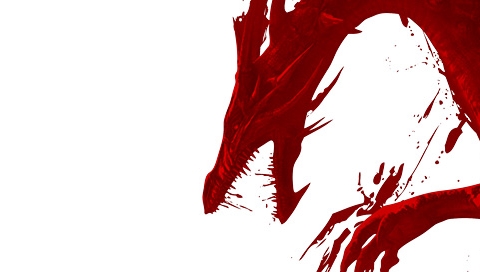
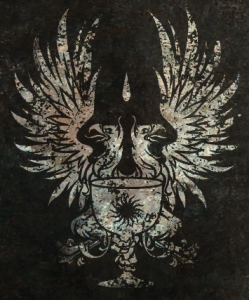
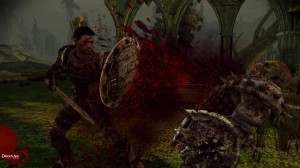



I want a college sweater from the School of Blood Magic. Or a bumper sticker. “My child is an honor student at The School of Blood Magic.”